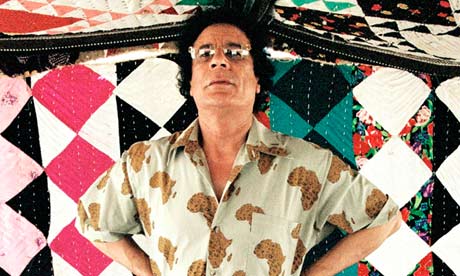The report found that dissidents were transferred to Libya in 2004 not to combat terrorism, but to buy favour with the Gaddafi regime. Photograph: Sipa Press/Rex Features
Report on US rendition programme by non-partisan thinktank finds highest officials were responsible for torture
An independent examination of the US rendition programme after 9/11 has concluded that it is "indisputable" that America tortured prisoners, and that the country's highest officials were responsible.
A 580-page report published on Tuesday by the Constitution Project, a non-partisan Washington-based thinktank, concludes that the programme was unjustified and counterproductive, damaging to the country's reputation, and has placed US military personnel at risk of mistreatment if they are themselves taken prisoner.
In findings similar to those of a report published two months ago by the New York NGO Open Society Justice Initiative, the study concludes that the US rendition programme enjoyed widespread international co-operation, with the UK, Canada, Italy, Germany and Sweden identified as prominent supporters alongside Egypt, Syria, Morocco and Jordan.
The authors also conclude that the UK-Libyan rendition operations that resulted in the abduction of two dissidents who were taken to Tripoli along with their families in 2004 were intended not to combat international terrorism, but to "gain favour" with the Gaddafi regime.
"Apparently someone (almost certainly at the CIA) thought that since theUnited States was sending people all around the world in our secret rendition programme to combat terrorism aimed at the United States, it would be a good idea to take advantage of the system to transfer some people to Libya in an effort to gain favour with that country's rulers," the report says. "We and the British government thought we were buying favour with Gaddafi's secret service."
Although some of the victims of those renditions are now in positions of some influence in post-revolutionary Libya, "the worst of the potential consequences of the earlier US actions appears to have been averted," the report says. In interviews, "the leaders of the revolt that overthrew Gaddafi expressed surprisingly little bitterness or even anger toward America. (Their attitude towards Britain is a different story.)"
The report also concludes that the CIA operated secret prisons within three European countries: Poland and Lithuania, which have acknowledged their existence, and Romania, which continues to deny that such a facility existed.
The study was embarked upon following the decision by the US president, Barack Obama, on entering the White House in 2009 that there would be no official inquiry into the rendition programme, on the grounds that it would be politically unproductive to "look backwards" rather than forwards.
The Constitution Project enjoyed no access to classified material – unlike the Senate's Intelligence Committee, whose 6,000-page report remains secret – but is nevertheless the most detailed attempt yet to produce a public reckoning of the impact of the rendition programme.
The panel of authors was chaired by Asa Hutchinson, a former Republican congressman who served as an under-secretary at the department of homeland security during the George W Bush administration. Other members include Thomas Pickering, a former US ambassador to the United Nations, a retired lieutenant general from the US army, a former president of the American Bar Association, and a retired army brigadier who taught interrogation techniques.
In one of their most damning conclusions, the panel says: "In the course of the nation's many previous conflicts, there is little doubt that some US personnel committed brutal acts against captives, as have armies and governments throughout history. But there is no evidence there had ever before been the kind of considered and detailed discussions that occurred after 11 September, directly involving a president and his top advisers on the wisdom, propriety and legality of inflicting pain and torment on some detainees in our custody."
The report calls for the revision of the US army's field manual on interrogation, to prohibit interrogation lasting 40 hours, and to introduce unambiguous bans of the use of stress positions and sleep deprivation.
In an appendix, the authors dismiss arguments – which have frequently followed party lines in the US – that the mistreatment of detainees after 9/11 fell short of torture, citing cases in which comparable treatment was prosecuted as torture by the US in the past.

No comments:
Post a Comment